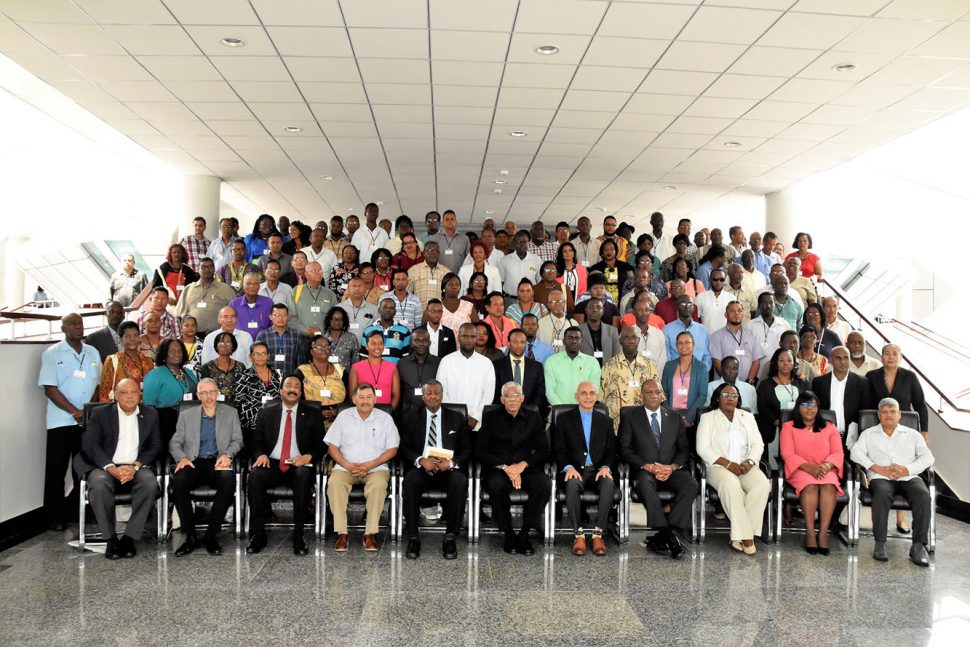President David Granger yesterday challenged Neighbourhood Democratic Councils (NDCs) to lead the revitalisation of the economic and cultural lives of villages.
Speaking in the backdrop of local government elections which are scheduled for November 12th,he said that central government through the Ministry of Communities will work with elected local authorities and other stakeholders to develop and improve the quality of life of their residents.
Addressing the opening of the one-day National Conference of Local Democratic Organs (NCLDO) yesterday at the Arthur Chung Conference Centre, at Liliendaal, Granger said, “Village economies must flourish with the establishment of micro- and medium-scale enterprises to generate cottage industries and businesses–what one political leader calls a ‘plantain chip economy.’”
Noting that the process of migration is relentless and that people have always moved from rural to urban areas, leaving some areas depopulated and that many residents also work outside of their villages, he emphasised that village economies have to be rebuilt to encourage young people, in particular, to remain in villages. In rebuilding to stimulate local employment and enterprise, he said, villagers can grow food again because the village dams are intact. “They can produce goods. They can provide services again. Village lands can bloom again by being placed under cultivation,” he noted,
Village economies, Granger also said, can be revitalised like democracy by ensuring there are regular local government elections and that villagers elect local leaders who care for their communities, who represent their constituencies and who bring about positive changes.
He also called for the revival of the cultural life of villages.
He said, “Villages must have happy homes. We must prevent drugs from seeping into villages. We must ensure that families are safe and happy and neighbourhoods are protected.”
He continued, “We must look to make village economies more socially cohesive units, promoting and developing harmony.”
Community centres, he said, must come alive again with authentic, cultural and social activities, and with fair amount of spaces in anticipation of regional agricultural and commercial exhibitions, which can bring to the fore a wide range of cottage industries in the country. “The Neighbourhood Democratic Councils must drive this revitalisation process. They must ensure local democracy. They must revive the cultural lives and livelihood of people and rebuild strong economies,” he added.
Reiterating his call made at the recent National Toshaos Council that consideration must be given to village improvement plans (VIPs), Granger said these plans are not only for Indigenous Peoples villages but for all villages across the nation.
Every village, he said, must have a VIP, which must be blueprints for improving delivery of services countrywide.
Every VIP must address as a priority, he said, the four major category of services – access to public education, creation of employment, the quality of life being linked to the environment, and access to safe water and renewable energy.
Speaking about the conference, which he suggested should be an annual event, Granger said it had its genesis in a meeting with NDC officials in March.
It was an educational experience for him, he said, as officials from across the political divide recounted their problems and the limited resources which they had to solve them.
This convinced him that the country needed a fresh approach to local governance. Those present, he said, were not bound by party politics but by a commitment to their communities to see good things for their NDCs.
The problems were extensive and pervasive as their NDCs had not been managed by democratically elected councils but my Interim Management Committees (IMCs) imposed on them by the past administration.
“A whole generation grew up knowing about IMCs. They wanted to get rid of the notion that a minister could sit down in Fort Street, Kingston and micro-manage an NDC,” he observed.
At the end of that March meeting, Granger said, it was evident there was need for a structure within which the NDC officials could collaborate with their respective RDCs and Central Government to empower the lowest strata of democratic governance, hence the NCLDO.
The NCLDO, he said, is intended to become a platform to promote the work of the NDCs.
“It can provide the practical basis to work with central government and not against central government to strengthen community development and to improve the quality of life for residents.”
Noting that before entering office in 2015, the then opposition had picketed the last government to hold local government elections, Granger said, “less than a year after taking office we held local government elections.”
With the elections now scheduled for November 12th, he said, “As long as I am President we will have local government elections when they are constitutionally due. I will find money to make sure that local government elections are held. Democracy is expensive but the alternative is worse.”










